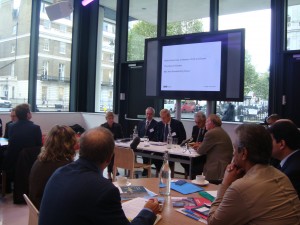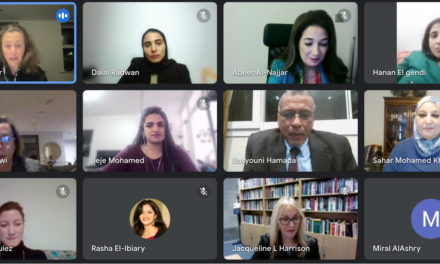The Centre for Freedom of the Media and the BBC College of Journalism jointly hosted a Symposium on Media Responses to Matters of Life and Death on 18 October in the BBC’s new London Headquarters at New Broadcasting House.Senior figures from leading international media titles mostly set aside scepticism about the value of UN interventions.
They voiced acute, often passionate, concerns about the rising toll of deaths, injuries and imprisonment of journalists worldwide.The BBC, CNN, Al Jazeera, Globo of Brazil, La Stampa of Italy, The Guardian, Dawn newspaper of Pakistan and more than 30 other news organisations, agreed to sign a London Statement of concern and of engagement with a newly-hatched UN-wide plan to shore up safeguards for media freedom – not only for journalism but also to enable people everywhere to speak without fear.
The London Statement will be formally presented, together with a video of extracts from the London Symposium, to the UN Inter-Agency Meeting on Safety of Journalists and Impunity being held in Vienna on 22 and 23 November 2012.
Peter Horrocks, the BBC’s Director of Global News, said that major news organisations have a responsibility to be more directly engaged in efforts to secure the freedom of the media to report, both within countries and across borders.
UNESCO’s Director of Freedom of Expression and Media Development Guy Berger, called the media gathering “unique”.
He told the 60 editors, journalists and experts present that everyone – journalists, editors, media owners and managers – should “up their game“on safety issues.
The alternative, he warned, was that enemies of free speech would be further emboldened to use “weapons of death” to silence criticism.
More journalists could be “paralysed by fear of death” for exposing corrupton — as is already the case in some states, as the Committee to Protect Journalists, Article 19 and Index on Censorship have documented in Mexico, Russia and elsewhere.
Mr Berger called on the world’s media to act by reporting about targeted murders and attacks, monitoring the actions of governments and of the UN and its agencies, and devising their own ways of exposing or confronting those who restrict free expressing and free reporting by illegitimate means, including governments.
Senior media figures heard for the first time about the UN Plan of Action on the Safety of Journalists and the Issue of Impunity, which was finalised this year. Mr Berger told the editors and journalists that the UN Plan could be a “game-changer” if the media wakes up to the collective danger.
Peter Horrocks, who manages BBC World TV, the World Service and the Corporation’s international websites, cited the rise in the toll of deaths of BBC journalists in Iraq, Afghanistan and elsewhere; the harassment of its staff in Iran; the detention and alleged mistreatment of a BBC journalist in Tajikistan; and current threats of violence against the BBC and local journalists in Pakistan as symptoms of increasing levels of violence and threats to free reporting around the world.
The Symposium’s intense discussion led to agreement by editors or executives of more than 40 international news organisations to sign the 8-point London Statement encourages news media to monitor the actions of governments with regard to journalists’ safety and calls for effective implementation of the UN Plan to stop the killings of journalists and end impunity – the situation prevailing in dozens of countries in which those responsible for targeted killings or attacks on journalists routinely escape justice.
Guy Berger urged serious journalists to tell those responsible for abuses or injustices face-to-face that the rule of law is being undermined, and hold them to account.
As examples of the potential impact of the UN Action Plan, he said UN agencies concerned with gender issues could address issues such as sexual violence that are of particular concern for women journalist.
The World Bank might join delegations that go to certain governments to press them to put an end to impunity, which often protects public officials from facing justice.
The London meeting heard real examples of journalists who are risking their lives to do just that. Veridiana Sedeh works for the Association of Investigative Journalism in Brazil, ABRAJI, where seven journalists have been killed so far in 2012 alone.
She told how in March Brazilian journalists were shocked to see that their government appeared to be obstructing the adoption of the UN Action Plan in the key UNESCO IPDC Council.
She tells, in the Journalism and Safety pages of the BBC College of Journalism website how ABRAJI issued a statement deploring its government’s decision and the story went viral in the Brazilian press. The government swiftly changed its stance, declaring its support for the Plan.
It even asked ABRAJI to contribute to the UN Plan of Action and since then Brazil has acted as a friend of press freedom internationally. For Brazilian journalists, she says, the UN Plan has great significance.
One of ABRAJI’s goals now is for UNESCO member states to mandate the Agency to strictly monitor the implementation of the UN Plan, establishing deadlines and publicly reporting its progress.
But the disappointing record of the past suggests that this goal might only be achieved if massive and sustained public and media pressure is mobilised, and soon. For years, the countries with the worst record on journalists’ deaths have played the state sovereignty card to resist international scrutiny.
That much is clear from the UNESCO Director-General ‘s 2012 Report on the Safety of Journalists and the Danger of Impunity
It details 36 states where between 2006 and 2009 a total of 244 journalists were killed (UNESCO non-exhaustive figures). In each case the state was asked what investigations or judicial follow-up had taken place. Nearly half of the states concerned failed to respond. Of those that did, most reported either No investigation or No information or Inquiries Ongoing even after several years. Only 8 convictions are recorded related to all those 244 deaths.
The argument for media vigilance and inquiry could hardly be clearer.
And Hamid Mir is an anchorman for Geo TV in Pakistan, where 80 media workers have been murdered in the past ten years.
Pakistan’s intelligence agency called him a traitor for often raising the issue of missing persons. Journalists are among the many who have been abducted and killed, mainly in the tribal areas including Baluchistan, without any credible attempt by the authorities to find and punish their killers.
Mr Mir says he has recently received phone calls from senior government officials telling him that he faces serious threats to my life and should be careful while speaking on television and writing for newspapers.
“There was a time when believed I could be provided with protection against threats by the law enforcement agencies”, he says, “But I have lately realised that nothing can be done to protect media persons when state agencies themselves decide to bully them.”
The scale of the patterns of violence and the personal tragedies involved were laid bare in often horrifying accounts at the symposium by frontline journalists working in some of the most dangerous regions for journalists, including Mexico, Pakistan, Sri Lanka, Russia, Somalia and the Philippines.
They spoke about recent case of abductions, torture, mutilation and murders of journalists which have caused widespread fear among the media and sometimes forced whole communities to suffer in silence under brutal regimes of violence run by warlords or drugs barons.
Bob Tyrer, the executive editor of the Sunday Times whose celebrated reporter Marie Colvin was killed by a Syrian army attack on Homs earlier this year, called for the UN to treat all murders of journaists as crimes against humanity. Nothing less would be enough, he said.
The BBC’s World News editor, Jon Williams, said the BBC’s journalism was based on the principle of impartiality, but it could not be impartial concerning the importance of freedom of expression.
William Horsley, CFOM’s international director, urged participants to make use of the existing UN mechanisms for pressuring states to conform with their binding obligations under international law.
They include the UN’s Special Procedures Branch, which asks governments to account for serious human rights violations concerning freedom of expression as well as torture, extrajudicial killings and various UN Conventions; the Human Rights Council’s regular audit of states’ records through the Universal Periodic Review process; and the UN Security Council’s Resolution 1738, which states that deliberate attacks on journalists in conflict zones may be considered as a threat to international peace.
In September 2012 the Human Rights Council adopted the first ever global Resolution on Safety of Journalists. That Resolution represents a significant political statement by the world’s principal human rights body that journalists’ ability to report on matters of public interest is a vital element of democratic society and must be respected.
UNESCO, the United Nations Educational, Scientific and Cultural Organization, says 95 journalists have been killed in the first 9 months of 2012, making it one of the worst years on record for targeted killings.
UNESCO states that in nine out of ten violent deaths of journalists the perpetrators are never brought to justice, and this gives rise to a spreading culture of impunity.
The London Symposium heard calls from some of the world’s best-known media organisations for more determined and consistent efforts by news media to expose “censorship by killing journalists”, and to end the cycle of violence and intimidation now evident in parts of Africa, Asia, Eurasia and Latin America.
The CFOM website www.cfom.org.uk and the BBC College of Journalism’s site www.bbc.co.uk/journalism both carry specially commissioned articles by frontline journalists from Mexico, Russia, Somalia, Pakistan and Brazil and other information related to the Symposium.
The BBC College of Journalism and CFOM organised the London meeting in partnership with the World Association of Newspapers (WAN-IFRA), the International Press Institute, Committee to Protect Journalists and International News Safety Institute.
The Open Society Foundations provided valuable support for the event.
Signatories of the London Statement include The African Editors Forum; Al Jazeera; Article 19; Association of Commercial Television in Europe; BBC Global News; Blue Dot Safety Training; Brazilian Association of Investigative Journalism (ABRAJI); Centre for Freedom of the Media, University of Sheffield; City University, London; CNN, Colombo Telegraph, Sri Lanka; Committee to Protect Journalists; Commonwealth Journalists Association; Commonwealth Media Group; Commonwealth Press Union Trust; Daily Telegraph; Dawn Newspaper, Pakistan; European Broadcasting Union; Federation of African Journalists; Frontline Club, London; Global Rolling News Live; Globo, Brazil; The Guardian; Hurriyet Newspaper, Turkey; Index on Censorship; International News Safety Institute; International Press Institute; L Siglo de Torreon, Mexico; La Stampa Newspaper; Media Legal Defence Initiative; Philippines National Union of Journalists; Radio Netherlands Worldwide; Radio Free Europe/Radio Liberty; Rory Peck Trust; Sky News; Somali National Union of Journalists; Society of Editors, UK; Thomson Reuters; World Association of Newspapers (WAN-IFRA); World Editors Forum.
Signed in a personal capacity: Dawood Azami, journalist; Ivor Gaber, journalist and UNESCO IPDC Council UK Representative; Anabel Hernandez, Mexican journalist; Emin Milli, Azerbaijan writer; and Hamid Mir, Geo TV presenter, Pakistan; Lorna Woods, Centre for Law, Justice and Journalism, City University London.





